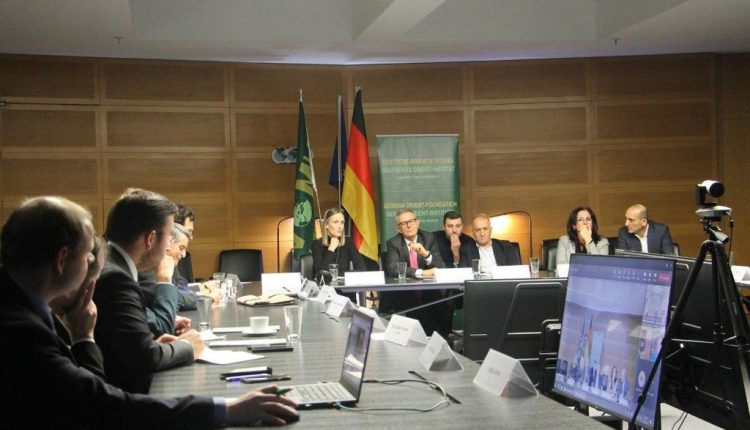In the context of a dialogue session, organized by the German Orient Institute, which was attended by high-ranking personalities from Syria, the current developments in North and East Syria were thoroughly discussed. Crucial key stakeholders were present, such as Badran Jiya Kurd, co-president of the department for Foreign Affairs, the co-president of the Assyrian Union Party as well as Dr. Andreas Reinke, German ambassador and director of the Eastern German Institute, alongside Christina Helberg, a renowned journalist.
In his speech, Badran Jiya Kurd highlighted the urgency to closely monitor the situation in the region. He further emphasized that the Autonomous Administration of North and East Syria constitutes an integral part of Syria and administers the region since 2014. Badran Jiya Kurd especially attempted to shed light on the multifold challenges, particularly regarding the Turkish menaces that jeopardize and undermine all activities, seeking to fight the existing terrorist threat. Furthermore, a sustainable and peaceful political solution for Syria is also hindered by the continuous Turkish attacks.
The Co-president further pointed out that the Turkish attacks on civil infrastructure and vital facilities in the region not only imperils the lives of all civilians but also creates more space and leeway for IS members to plan and carry out attacks. In addition, light was shed on the Turkish-occupied territories, such as Afrin, Serekaniye and Gere Spi, where gross human rights violations and crimes are committed on a daily basis. Thus, Badran Jiya Kurd again insistently called on the international community to actively intervene, in order to support the Autonomous Administration and protect them from further attacks.
Christian minorities particularly threatened by ISIS’ presence
Nazira Kouriya, co-president of the Assyrian Union Party, dedicated her speech to the situation of Christians and other minorities in North and East Syria. She stated that the inherent “Assyrian population are facing a huge peril if the terrorist organization ISIS succeeds to resume its activities”. According to her, a revival of ISIS might be possible at any time when Turkey continues its attacks on the region of North and East Syria and the international communities still rejects any kind of support. Lastly, she emphasized that the creation of the Autonomous Administration had been fortified by North and East Syria’s different ethnic components, pertinent for the assurance of the rights of minorities and women”.
The Autonomous Administration as a project for all groups
Renown German Journalist Christine Helberg shifted the focus on the current challenges, the Autonomous Administration of North and East Syria faces, most notably the repetitive Turkish attacks that undermine all efforts to effectively combat terrorism and reinstate stability and security in the region.
She further highlights that the creation of the Autonomous Administration of North and East Syria does not solely constitute a Kurdish project, but can rather be regarded as a groundbreaking initiative for the diversity of all population groups in the region. Helberg, a regular visitor to these areas and an expert on Syrian affairs, highlights that this administration actively includes Syrians, Armenians and Arabs in its structures.
Jiya Kurd appeals to the USA and Germany
In reference to priorly posed questions by the session’s participants, Badran Jiya Kurd stressed that Turkey fears the extension of the Autonomous Administration as this project is considered a guarantor of the rights of all peoples, which is what Turkey does not want to achieve, especially not for the Kurds. He subsequently concludes that Turkey’s hostile policies towards the region will not change as long as the rancor and grudge against the Kurdish people inside Turkey continues. Thus, the Turkish government first of all has to find a solution to the internal Kurdish issue before meddling into the affairs of another country.
Regarding the ubiquitous threat of terrorism, Badran Jiya Kurd emphasized the existing agreements with the USA, which primarily entail military measures. Nevertheless, he appealed for the cooperation to be expanded to include political concerns. He was critical of Turkey’s ongoing bombardment of the region and accused the state of exploiting the weaknesses of the international community.
At the end of the session, Badran Jiya Kurd concluded his speech by saying that the international community must not marginalize Syria and North and East Syria in light of the current developments in the region. Furthermore, a joint solution is needed in order to enhance the process the stabilization of the continuously menaced region.

